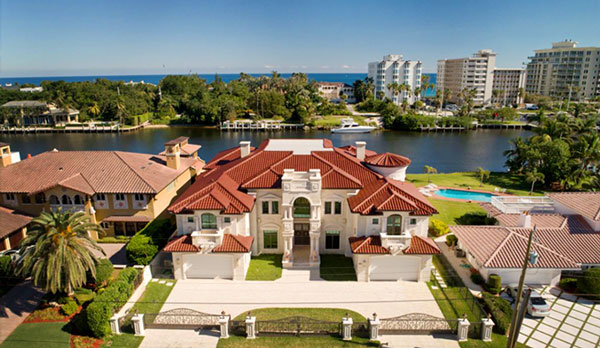From TRD Miami: A condo for sale in Miami hit the market earlier this month accepting only Bitcoin, grabbing headlines as one of the only U.S. real estate listings to limit itself to the cryptocurrency.
The one-bedroom pad at 480 Northeast 30th Street listed on Dec. 8 for 33 Bitcoin, or about $550,000 at the time, according to the listing agent. But as of Tuesday, 33 Bitcoin is now equal to about $603,000. In dollar terms, that’s a jump in the asking price of about 10 percent in less than two weeks.
As Bitcoin mania mints a new crop of millionaires, many who struck it rich betting on the cryptocurrency are looking for ways to diversify their wealth. Real estate agents and sellers are hoping to lure them by touting their Bitcoin-friendly listings.
“A lot of folks who have been speculating on Bitcoin are trying to find a place to put this wealth,” said Andrew Hinkes, a Miami-based attorney. Foreign investors sitting on “mountains of capital” could also turn to Miami real estate as a safe haven for their cryptocurrency fortunes, he said.
But the 480 Northeast 30th Street example illustrates just how tricky things can get. Bitcoin’s price has skyrocketed in recent weeks, leaving many sellers and agents confused about how to integrate it into their businesses. How do you price properties or accept payments in a currency with such volatility? And prices aren’t just going in one direction – on Monday, Bitcoin was hovering at around $19,000, but by Tuesday, it was down to $18,200.
On Monday, William Kakon launched Blockchain RE, which he describes as an international cryptocurrency real estate listing company. Kakon, a Miami real estate broker who bet on Bitcoin early, proposed a workaround to its wild volatility – locking in the price in dollars right away. For a 4 percent transaction fee, the company will arrange the deals, including title work, and use bitcoin payment processors Bitpay and Coinbase Vault.
Deals can happen in three ways: entirely through Bitcoin or Ethereum, converting to cash as is necessary for title purchases, or converting the cryptocurrency to cash.
For sellers, accepting Bitcoin “gives someone the ability to buy a large amount [of the cryptocurrency] without overpaying,” cryptocurrency attorney Matt Gertler said. “It’s often difficult to buy a large amount of Bitcoin at a time.”

4200 Northeast 31st Avenue, Lighthouse Point
Some sellers are giving it a shot. A Lighthouse Point mansion, which property records show is owned by Anna Martin, is hitting the market for $14.8 million or its equivalent in Bitcoin. The seven-bedroom, 9,000-square-foot mansion at 4200 Northeast 31st Avenue, dubbed the Golden Palace, is being marketed by Stephan Burke and Carol Cassis of Brown Harris Stevens Miami.

Oceana Key Biscayne unit 701S
At Oceana Key Biscayne, a Venezuelan family is accepting Bitcoin for a four-bedroom condo asking nearly $6 million. Unit 702S hit the market with Douglas Elliman’s Michael Light of Miami Luxury Homes in October, but Light said he’s yet to receive any cryptocurrency bids.

3604 Matheson Avenue
So far, most – if not all – listings in South Florida accepting Bitcoin have closed by converting the buyer’s Bitcoin into cash. In September, Bitcoin investor Michael Komaransky paid $7.55 million for a waterfront spec mansion at 3604 Matheson Avenue in this manner. The previous month, he listed his mansion at 7350 Southwest 47th Court – a property he purchased by also converting Bitcoin to cash – for just under $6.5 million.
Bitcoin operates through a technology known as blockchain, which can be thought of as a linear series of blocks of code that create a record of every transaction and every access point. Keyholders, who each have a unique access code, can access a blockchain from virtually anywhere and can share important data with all parties in a transaction.
The real gains in efficiency and security will happen when the entire transaction is blockchain-based, said Ragnar Lifthrasir, founder of the International Blockchain Real Estate Association, a trade organization focused on implementing blockchain in real estate. Brokers would automatically receive their commissions, payable in Bitcoin.
“The big benefit is not needing to rely on an intermediary – a bank, an escrow officer, all the middlemen we typically have to use,” said Lifthrasir, founder of Velox.RE, a blockchain real estate startup based in California, that created a blockchain deed software implemented in Chicago’s Cook County. “Transferring that amount of money through a bank can be a pain.”
The unregulated space could also appeal to buyers with secretive or illicit sources of wealth, experts said.
Khoi Dang, a corporate attorney at Duane Morris in Los Angeles, said blockchain technology may potentially open the doors to shadier deals.
“It provides some level of anonymity as to the source of the funds,” Dang said. “Because of that, it does lend itself to a way of moving currency [unwatched] outside of the country.”
And foreign buyers who want to avoid the red tape of the current process may be particularly drawn to Bitcoin.
“No one can stop you,” Bitcoin advocate and investor Joshua Unseth said. “You’re avoiding a lot of international regulations.”
